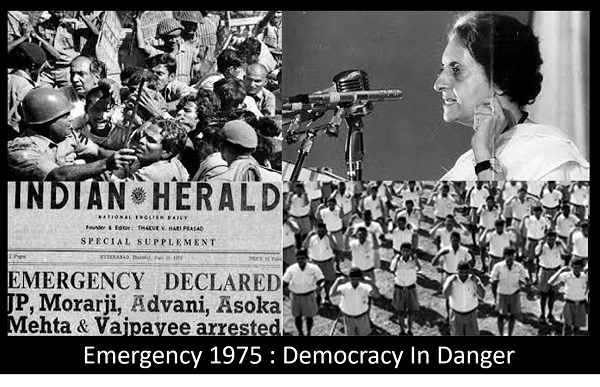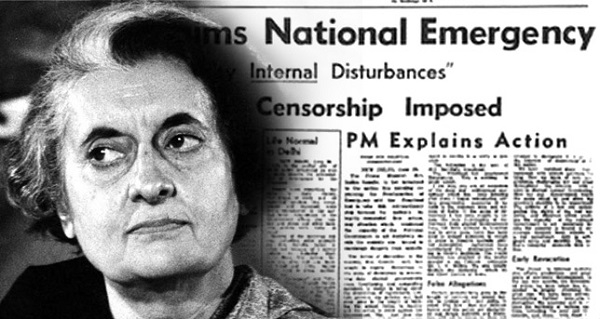Aftermath of Emergency Prisoners (Women) And Their Contribution To The Nation
Total Views |
Democracy and the resulting values like personal liberty and freedom of speech are considered as the achievement of freedom struggle we fought and the constitution we framed. The struggle did not end here. Later came many occasions where arbitrary and dictatorial actions threatened this very democracy and the struggle to save these values was a “constant on”. Declaration of Emergency during 1975-77 was one of such dark periods that the Nation cannot forget. It was set in motion by the Indira Gandhi Government on 25th June 1975 and was in place until 21st March 1977 i.e. for 21 months.
Officially ‘internal disturbance’ was the reason which was put forth. But it allowed elections to be suspended and civil liberties were curbed. Fundamental rights were suppressed, political arrests took place under the “Maintenance of Internal Security Act” and an atmosphere of fear prevailed. All the newspapers in the country were asked to take permission before publishing anything by the Press Advisor. All the political opponents of Smt. Gandhi like the then Janata Party leader LK Advani, Bhagat Singh Koshyari, Madhukar Dattatraya Deoras, Arun Jetly, student leaders, social activists, and journalists were arrested.

Rashtriya Swayamsevak Sangh, was also banned - for organizing the protests against the Government. Thousands of its workers were imprisoned. The RSS defied the ban and thousands participated in Satyagraha i.e. peaceful protests against the ban and the curtailment of fundamental rights. Later, when there was no letup, the volunteers of the RSS formed underground movements for the restoration of democracy. Literature that was censored in the media was published and distributed on a large scale and funds were collected for the movement. Networks were established between leaders of different political parties in the jail and outside for the co-ordination of the movement. ‘The Economist’ described the movement as "the only non-left revolutionary force in the world". It said that the movement was "dominated by tens of thousands of RSS cadres, though more and more young recruits are coming". Talking about its objectives it said, "its platform at the moment has only one plank: to bring democracy back to India".
A total of 23,015 people were arrested under MISA and D.I.R. out of which 16,383 people were the Swayamsevaks and Karyakartas of RSS, Janasangh, Rashtriya Sevika Samiti, VHP, ABVP and other such organizatios. 44,965 people were arrested for fighting and agitating by way of Satyagraha out of which 35,310 were from the above mentioned right – wing organizations. Indeed, the democracy was fought for, saved and protected by raising the voice in such a dark period by these fighters.
Finally, this movement of Satyagraha ended on March 23, 1977. The MISA Act got repealed when Smt. Indira Gandhi lost the general election. Apart from the end result, it is noteworthy to see the women's participation in these Satyagrahas. Whenever RSS is blamed for not having women Karyakartas, one overlooks that during such an ‘emergency’ women activists were seen to be participating with equal vigor along with the Swayamsevaks. Many girls and women from the offshoots of RSS like ABVP, Rashtriya Sevika Samiti, VHP, etc. along with women leaders of Janasangha got arrested for Satyagraha as well as under MISA Act. A total number of 2,424 women were arrested for holding Satyagraha and Maharashtra was leading in the number.
I always find myself asking a question about the aftermath of such protests and agitations. Slogans like ‘Hame Chahiye Ajadi’ and for Afzal Guru fade very soon. We neither see anything productive coming out of these “screams”. But how do the protestors thereafter pursue their fight? I was pondering on the same untill I got acquainted with Mrs. Anjali Parchure - Deshpande who was one of the detainees of Satyagraha against emergency. Mrs. Anjali Deshpande was an active volunteer of Akhil Bharatiya Vidyarthi Parishad. ABVP was holding Satyagrahas in all the colleges across the country and so in Pune. Other organizations were also engaged in similar activities in every chowk and on every road. Anjalitai was the organizer of a girls batch who protested in Saint Meera’s College. She, along with the other student Satyagrahis got arrested as expected. Further they were tried and got about 1 to 3 months imprisonment in Yerawada Jail, Pune. Surprisingly the jail was overflowing by approximately 250 women protestors; and the majority of them were from offshoots of RSS. Mrs. Anjali Deshpande recollects few names like Jaywantiben Mehta, Sumatibai Sukalikar along with Smt. Pramila Dandavate, Ahilya Rangnekar etc. She immerses in nostalgia with the memories of daily activities in jail. Despite being an organizer of Satyagraha, Mrs. Anjali Deshpande was not tried under MISA Act and was released after the imprisonment of 1month.

Then came the more interesting part of the whole narration about which I was curious. After the success of their protests and activities, the volunteers not only kept on working for RSS, but many women devoted their time to their respective organizations too. The difference between the other and right-wing activism was now clear to me. Mrs. Anjali Deshpande herself became the 1st full-time women volunteer in India and worked for 4 years. She continued serving through ABVP, even after her marriage. Anjali Sarolkar Pathak who worked for Vanavasi Kalyan Ashram at Manipur and after marriage the couple continued the same work in Maharashtra. Mrs. Sunita Puranik Godbole who was co-prisoner with Anjalitai now works for Vanvasi Kalyan Ashram in Jagdalpur, Bastar which is a Naxalite area. Anupama Limaye who also was a Satyagrahi with Anjalitai was elected as a corporator in Pune and now runs an NGO – ‘Swamini’ for women empowerment. Jaywantiben Mehta was imprisoned for 19 months. She performed her active role in BJP. She was elected to the Maharashtra legislative assembly, then to Lok Sabha and served as a Minister of Power in the Vajpayee Govt. Smt. Sumatibai Suklikar too became a prominent leader of BJP. Many volunteers of Rashtriya Sevika Samiti and other organizations are still actively working for their organizations.
Mrs. Anjali Deshpande with her fight for freedom of speech is now active in ‘Drishti’. Drishti works for collecting information, documentation and research related to women’s issues in India. The right to information is an important right which helps to protect freedom of speech. Therefore she finds her work of information compilation and its documentation very much important. Drishti has carried out some major researches throughout India. Research on the socio-economic status of women in India, research on tribal women from Jharkhand, Chhattisgarh, Orissa migrating to big cities for working as house maidservants, research on declining female sex ratio in Hariyana are the few pieces of research carried out by Drishti.
It was an enriching and inspiring talk with Anjalitai. Participation of women volunteers along with RSS Swayamsevaks to re-establish and save the democratic principles was indeed very much important. And foremost important was the ‘constructive approach’, continuance, and perseverance of the right-wing Karyakartas in their work.
(The figures and numbers have been referred from the book “Apatkalin Sangharsha Gatha” by M. C. Vajpayee )

